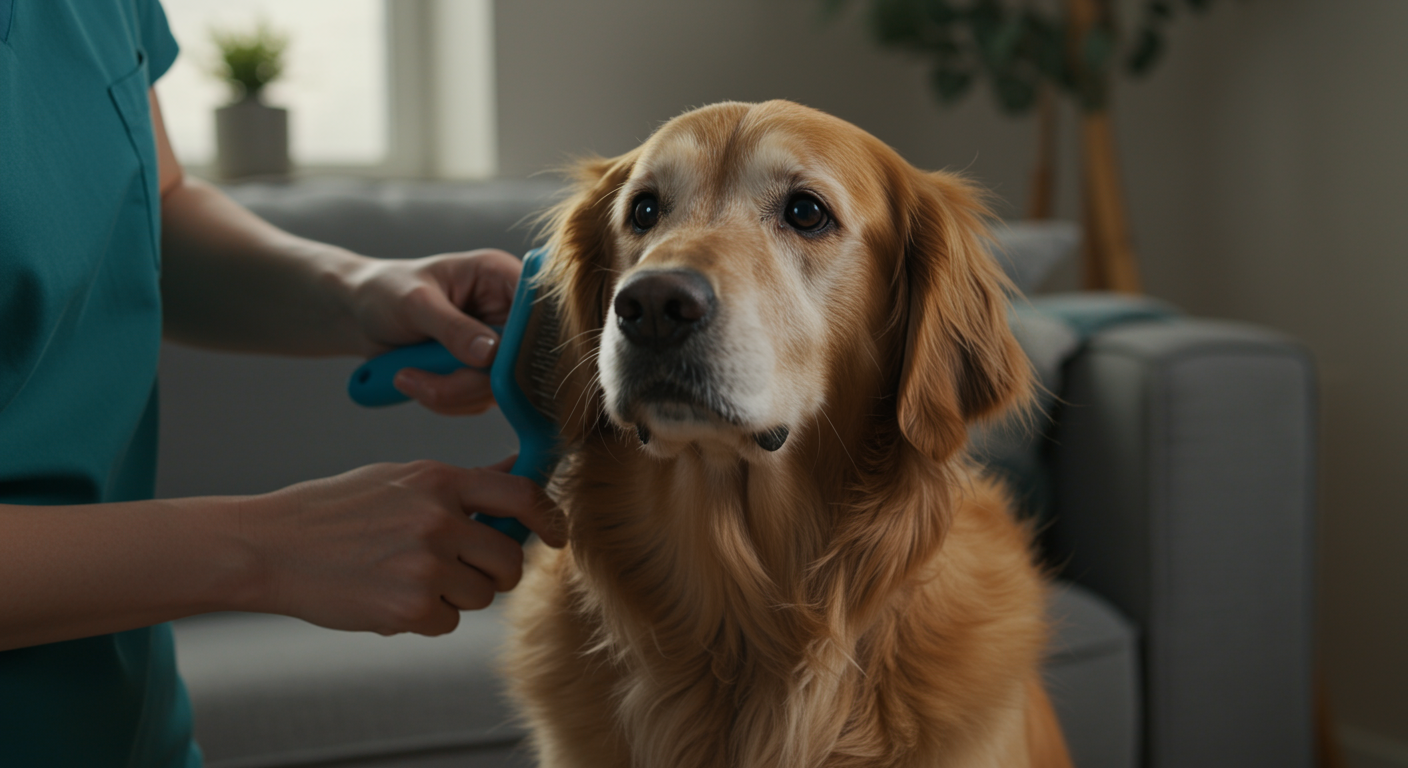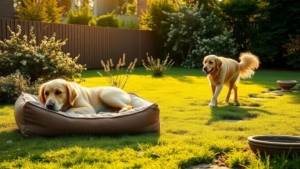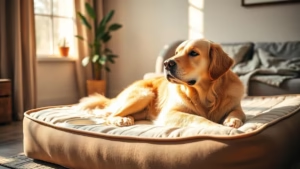The lustrous golden coat that defines the Golden Retriever breed undergoes significant changes as these beloved dogs enter their senior years, requiring adapted care strategies to maintain health, comfort, and appearance. Senior Golden Retrievers face unique dermatological challenges including decreased oil production, increased sensitivity, slower healing, and age-related skin conditions that demand specialized attention. Understanding these changes and implementing appropriate care protocols can preserve coat quality, prevent skin problems, and maintain the comfort that contributes to overall well-being during their golden years.
The importance of proper coat and skin care extends far beyond cosmetic concerns. The skin serves as the body’s largest organ and primary barrier against environmental threats, making its health crucial for overall wellness. Senior Golden Retrievers with compromised skin barriers become more susceptible to infections, allergic reactions, and discomfort that can significantly impact quality of life. Additionally, regular grooming sessions provide valuable opportunities for health monitoring, allowing early detection of lumps, bumps, or other changes that require veterinary attention.
Golden Retrievers possess double coats consisting of a water-resistant outer layer and insulating undercoat, both of which require specific care approaches that evolve with age. Senior dogs may struggle with self-grooming due to arthritis or mobility limitations, making human assistance increasingly important. The goal of senior coat and skin care involves maintaining cleanliness, preventing matting, supporting natural skin functions, and ensuring comfort while adapting techniques to accommodate physical limitations and changing needs.
Understanding Senior Skin and Coat Changes
Age-Related Physiological Modifications
Senior Golden Retrievers experience numerous changes in skin structure and function that directly impact coat quality and care requirements. These modifications begin gradually around age seven and become more pronounced with advancing years.
Sebaceous Gland Function: Oil-producing glands in the skin become less active with age, resulting in decreased natural lubrication of the coat and skin. This reduction leads to drier, more brittle hair that’s prone to breakage and skin that may become flaky or irritated more easily.
Skin Thickness and Elasticity: Aging skin becomes thinner and loses elasticity, making it more fragile and susceptible to injury during grooming. The reduced collagen production affects skin’s ability to maintain moisture and recover from minor trauma.
Hair Growth Cycles: The natural hair growth cycle slows with age, resulting in longer periods between shedding cycles and potentially patchy regrowth. Senior Golden Retrievers may develop areas of thinning hair or take longer to regrow coat after seasonal shedding.
Circulation Changes: Reduced blood circulation to the skin affects nutrient delivery and waste removal, potentially impacting coat quality and skin health. This change may manifest as duller coat color, slower healing of minor wounds, or increased susceptibility to skin conditions.
Common Senior Skin Conditions
Seborrheic Dermatitis: This condition involves overproduction or underproduction of skin oils, leading to either greasy, smelly skin or dry, flaky conditions. Senior Golden Retrievers may develop either form, requiring different treatment approaches.
Hot Spots (Acute Moist Dermatitis): These painful, inflamed areas of skin can develop rapidly in senior dogs, often triggered by allergies, moisture, or minor injuries. Senior dogs may be more prone to hot spots due to decreased grooming ability and compromised skin barriers.
Age-Related Tumors: Senior Golden Retrievers commonly develop various skin growths including sebaceous adenomas, lipomas, and other benign tumors. While often harmless, these growths require monitoring and may affect grooming routines.
Allergic Dermatitis: Environmental and food allergies may worsen with age or develop for the first time in senior years. Symptoms include itching, redness, and secondary skin infections from scratching.
Common Senior Skin Conditions
| Condition | Symptoms | Typical Causes | Treatment Approach | Prevention Strategies |
|---|---|---|---|---|
| Seborrheic Dermatitis | Flaky or greasy skin, odor | Hormonal changes, genetics | Medicated shampoos, supplements | Regular bathing, proper nutrition |
| Hot Spots | Red, moist, painful areas | Allergies, moisture, trauma | Topical treatments, antibiotics | Keep coat dry, address allergies |
| Skin Tumors | Lumps, bumps, growths | Age-related cell changes | Veterinary evaluation | Regular monitoring, sun protection |
| Allergic Dermatitis | Itching, redness, scratching | Environmental/food allergens | Allergy management, medications | Allergen avoidance, hypoallergenic products |
| Dry Skin | Flaking, dullness, brittleness | Decreased oil production | Moisturizing products, supplements | Humidification, gentle products |
Adapted Grooming Techniques for Senior Dogs
Gentle Brushing Strategies
Senior Golden Retrievers require modified brushing techniques that accommodate sensitive skin, potential mobility limitations, and changing coat characteristics.
Tool Selection: Choose brushes with softer bristles or pins to avoid irritating sensitive senior skin. Slicker brushes should have protective tips, and pin brushes should have rounded ends to prevent scratching. Consider tools with ergonomic handles that reduce strain on both dog and owner.
Frequency Adjustments: While daily brushing remains ideal, senior dogs may benefit from shorter, more frequent sessions rather than lengthy grooming periods. This approach reduces fatigue and stress while maintaining coat health.
Technique Modifications: Use lighter pressure and slower movements when brushing senior dogs. Pay attention to body language indicating discomfort and adjust technique accordingly. Focus on preventing mats rather than removing existing ones, which can be painful for sensitive skin.
Problem Area Management: Senior Golden Retrievers often develop mats in areas they can’t reach easily, such as behind ears, under arms, and around the rear end. These areas require gentle, patient attention with appropriate tools.
Bathing Protocols for Senior Golden Retrievers
Frequency Considerations: Senior dogs typically require less frequent bathing than younger dogs due to reduced activity levels and oil production. Over-bathing can strip natural oils from already dry skin, while under-bathing may allow skin conditions to develop.
Water Temperature: Use lukewarm water to avoid shocking sensitive skin or causing discomfort. Senior dogs may have difficulty regulating body temperature, making proper water temperature crucial for comfort.
Shampoo Selection: Choose gentle, moisturizing shampoos specifically formulated for senior dogs or sensitive skin. Avoid harsh detergents or fragrances that might irritate aging skin.
Bathing Environment: Ensure secure footing with non-slip mats and consider using a handheld sprayer for better control. Senior dogs with mobility issues may benefit from raised bathing stations or assistance getting in and out of tubs.
Senior Dog Bathing Guidelines
| Aspect | Frequency | Products | Technique | Special Considerations |
|---|---|---|---|---|
| Normal Skin | Every 6-8 weeks | Gentle, moisturizing shampoo | Lukewarm water, thorough rinse | Monitor for skin reactions |
| Dry Skin | Every 8-12 weeks | Oatmeal or moisturizing formula | Cool water, leave-in conditioner | Avoid over-bathing |
| Oily Skin | Every 4-6 weeks | Degreasing shampoo | Warm water, double rinse | May need medicated products |
| Skin Conditions | As directed by vet | Medicated shampoos | Follow veterinary instructions | Monitor treatment response |
| Mobility Issues | As needed | Waterless shampoos available | Assistance required | Consider professional grooming |
Nutritional Support for Coat and Skin Health
Essential Fatty Acids
Omega-3 and omega-6 fatty acids play crucial roles in maintaining healthy skin and coat in senior Golden Retrievers. These nutrients support skin barrier function, reduce inflammation, and promote coat shine.
Omega-3 Sources: Fish oil supplements provide EPA and DHA, which offer anti-inflammatory benefits for skin conditions. Recommended doses typically range from 100-300mg combined EPA/DHA per 10 pounds of body weight daily.
Omega-6 Balance: While omega-6 fatty acids are important for skin health, the ratio between omega-3 and omega-6 is crucial. Most commercial diets provide adequate omega-6, making omega-3 supplementation more important.
Quality Considerations: Choose high-quality fish oil supplements that are molecularly distilled to remove contaminants and stored properly to prevent rancidity.
Protein Requirements
High-quality protein becomes increasingly important for senior dogs to maintain coat quality and support skin repair processes.
Amino Acid Profile: Complete proteins containing all essential amino acids support keratin production, the primary protein in hair and skin. Look for named meat sources as primary ingredients in senior dog foods.
Digestibility: Senior dogs may have reduced digestive efficiency, making highly digestible protein sources more important. Easily absorbed proteins ensure adequate amino acid availability for coat and skin maintenance.
Vitamins and Minerals
Vitamin E: This antioxidant protects skin cells from free radical damage and supports immune function. Senior Golden Retrievers may benefit from 100-400 IU daily, depending on their overall antioxidant intake.
Zinc: Essential for skin health and wound healing, zinc deficiency can cause coat dullness and skin problems. Most high-quality senior dog foods provide adequate zinc, but supplementation may be beneficial in some cases.
Biotin: This B-vitamin supports healthy coat growth and skin cell turnover. While deficiency is rare, biotin supplementation may benefit dogs with coat quality issues.
Environmental Factors Affecting Senior Skin Health
Climate Considerations
Humidity Levels: Low humidity environments can exacerbate dry skin conditions in senior Golden Retrievers. Consider using humidifiers during dry seasons to maintain optimal moisture levels.
Temperature Extremes: Senior dogs may be more sensitive to temperature fluctuations. Protect from excessive sun exposure, which can damage aging skin, and provide warmth during cold weather.
Seasonal Adjustments: Modify grooming routines based on seasonal changes. Winter may require more moisturizing products, while summer might necessitate increased bathing frequency due to higher activity levels.
Indoor Air Quality
Allergen Management: Senior dogs may develop new sensitivities or have existing allergies worsen with age. Regular cleaning, air filtration, and allergen reduction can help maintain skin health.
Chemical Exposure: Household cleaners, air fresheners, and other chemicals can irritate sensitive senior skin. Choose pet-safe products and ensure adequate ventilation when using cleaning products.
Professional Grooming Considerations
When to Seek Professional Help
Mobility Limitations: Senior Golden Retrievers with arthritis or other mobility issues may benefit from professional grooming services that can accommodate their physical limitations.
Specialized Treatments: Professional groomers can provide medicated baths, specialized skin treatments, and expert mat removal that may be difficult to accomplish at home.
Health Monitoring: Experienced groomers can identify skin changes, lumps, or other health concerns that owners might miss during routine home care.
Choosing Senior-Friendly Groomers
Experience with Senior Dogs: Look for groomers who have experience working with older dogs and understand their special needs and limitations.
Facility Accommodations: Choose grooming facilities with non-slip surfaces, comfortable temperatures, and equipment designed for senior dog comfort.
Flexible Scheduling: Some groomers offer shorter appointment times or more frequent visits to reduce stress on senior dogs.
Professional Grooming Services for Seniors
| Service | Benefits | Frequency | Cost Considerations | Special Requirements |
|---|---|---|---|---|
| Full Grooming | Complete care, health monitoring | Every 6-8 weeks | Higher cost, comprehensive service | May need senior-experienced groomer |
| Bath and Brush | Maintains cleanliness, basic care | Every 4-6 weeks | Moderate cost | Good for mobility-limited dogs |
| Nail Trimming | Prevents overgrowth, mobility issues | Every 4-6 weeks | Low cost, essential service | May need restraint assistance |
| Medicated Baths | Treats skin conditions | As prescribed | Variable cost | Requires veterinary prescription |
| Mobile Grooming | Reduces travel stress | Flexible scheduling | Premium pricing | Ideal for anxious or mobility-limited dogs |
Managing Specific Senior Coat Challenges
Matting Prevention and Removal
Senior Golden Retrievers are more prone to matting due to reduced self-grooming ability and changes in coat texture.
Prevention Strategies: Daily brushing in problem areas, keeping coat at manageable length, and addressing mats immediately prevent larger problems from developing.
Safe Removal Techniques: Use mat splitters or dematting tools carefully to avoid injuring sensitive skin. Work from the outside of mats toward the skin, never pulling or cutting blindly.
Professional Intervention: Severe matting may require professional removal under sedation to prevent pain and injury to senior dogs.
Shedding Management
Seasonal Patterns: Senior dogs may have altered shedding patterns, with some experiencing increased shedding due to stress or health conditions.
Tools and Techniques: Undercoat rakes and deshedding tools can help manage excessive shedding, but use them gently on senior skin.
Health Monitoring: Sudden changes in shedding patterns may indicate health issues requiring veterinary evaluation.
Skin Health Monitoring and Early Detection
Regular Inspection Protocols
Weekly Examinations: Incorporate thorough skin examinations into weekly grooming routines, checking for lumps, bumps, rashes, or other changes.
Documentation: Keep records of any skin changes, including photographs when possible, to track progression and assist veterinary evaluation.
Warning Signs: Be alert for signs requiring immediate veterinary attention, including rapidly growing lumps, open sores, persistent itching, or changes in eating or behavior.
Common Senior Skin Growths
Sebaceous Adenomas: These benign growths are common in senior Golden Retrievers and typically don’t require treatment unless they become irritated or infected.
Lipomas: Fatty tumors that are usually benign but should be monitored for size changes or interference with movement.
Mast Cell Tumors: More serious growths that require prompt veterinary evaluation and potential treatment.
Skin Tags: Small, benign growths that may catch on brushes or collars but are generally harmless.
Therapeutic Interventions for Senior Skin Conditions
Topical Treatments
Moisturizing Products: Leave-in conditioners, skin moisturizers, and protective balms can help maintain skin barrier function in senior dogs.
Medicated Shampoos: Prescription shampoos containing ingredients like chlorhexidine, ketoconazole, or benzoyl peroxide may be necessary for specific skin conditions.
Spot Treatments: Topical antibiotics, antifungals, or anti-inflammatory products may be prescribed for localized skin problems.
Systemic Therapies
Oral Medications: Antibiotics, antifungals, or anti-inflammatory drugs may be necessary for severe or widespread skin conditions.
Allergy Management: Antihistamines, immunosuppressive drugs, or allergy shots may help manage allergic skin conditions in senior dogs.
Hormonal Treatments: Some skin conditions in senior dogs may be related to hormonal changes requiring specific treatments.
Creating Comfortable Grooming Experiences
Stress Reduction Techniques
Familiar Environment: Conduct grooming in familiar, comfortable locations when possible to reduce anxiety in senior dogs.
Positive Associations: Use treats, praise, and gentle handling to create positive associations with grooming activities.
Gradual Introduction: Introduce new grooming tools or techniques gradually to allow senior dogs time to adjust.
Respect Limitations: Recognize when senior dogs are tired, uncomfortable, or stressed and adjust grooming sessions accordingly.
Adaptive Equipment
Ergonomic Tools: Choose grooming tools that are comfortable for both dog and owner, reducing strain during grooming sessions.
Non-Slip Surfaces: Provide secure footing during grooming to prevent falls or injuries in senior dogs with mobility issues.
Supportive Positioning: Use grooming tables with adjustable heights or provide support for dogs who have difficulty standing for extended periods.
Long-Term Coat and Skin Health Strategies
Preventive Care Programs
Regular Veterinary Monitoring: Schedule routine skin examinations as part of senior wellness visits to detect problems early.
Nutritional Optimization: Work with veterinarians to ensure senior dogs receive optimal nutrition for skin and coat health.
Environmental Management: Maintain consistent, comfortable environments that support healthy skin function.
Quality of Life Considerations
Comfort Priority: Focus on maintaining comfort rather than perfect appearance as dogs age and develop physical limitations.
Adaptation Strategies: Modify grooming routines as needed to accommodate changing health status and mobility.
Family Education: Ensure all family members understand proper senior dog grooming techniques and warning signs to watch for.
Nurturing the Golden Years Through Proper Care
Coat and skin care for senior Golden Retrievers represents far more than maintaining appearance—it embodies a commitment to comfort, health, and dignity throughout their golden years. The investment in proper grooming techniques, appropriate products, and regular monitoring pays dividends in improved comfort, early detection of health issues, and maintained quality of life that allows these beloved companions to age gracefully.
The evolution from routine grooming to specialized senior care reflects the deepening bond between Golden Retrievers and their families. Each gentle brush stroke, carefully chosen product, and patient grooming session demonstrates understanding of changing needs and dedication to providing the best possible care during this precious phase of life.
Success in senior coat and skin care lies not in maintaining the perfect appearance of younger years but in adapting approaches to support aging bodies while preserving comfort and health. The goal extends beyond cosmetic concerns to encompass overall well-being, early health detection, and the maintenance of the human-canine bond through caring touch and attention.
Your commitment to providing excellent coat and skin care for your senior Golden Retriever ensures that their golden years remain truly golden—filled with comfort, health, and the continued joy that comes from feeling loved and well-cared for. Through thoughtful adaptation of grooming routines and attention to changing needs, you help preserve not only their physical comfort but also their dignity and the special beauty that defines Golden Retrievers throughout their lives.




